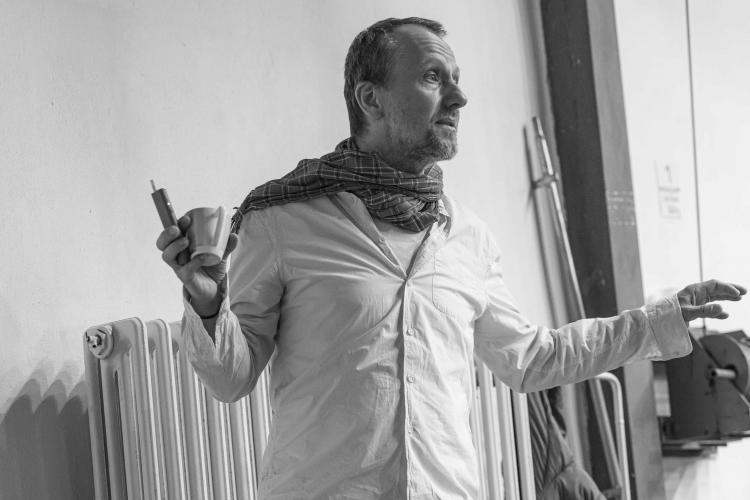Following Shaw’s Pygmalion, director Martin Čičvák comes back with guest actor Marek Geišberg and Drama Company ŠDKE with world-famous play Liliom by Ferenc Molnár. There are only a few days to the premiere on Friday, October 15th, in the Historical Building ŠDKE.
Why Liliom?
I was lucky that almost always I could do what I wanted. The so-called personal dramaturgy means that an actor is most important to me. All starts with an actor. Honza Hájek as Ivan in Činoherní klub, Ondřej Brousek as Caligula in Vinohrady or Peer Gynt and Róbert Roth as Faust in SND. Thanks to an actor’s intellect and talent I have a partner in front of me. Marek Geišberg has become such partner to me. That’s a decisive moment when a director can consider doing a great masterpiece. We got to know each other when we did Pygmalion with Marek. I heard him in Ostrava festival, that moment I called to the then Director of Drama Company ŠDKE, Milan Antol, that I will come to do Pygmalion. Košice is a good place to do that play. The town has a multi-language character, and Pygmalion is also philosophical discussion on language. This is how I met Marek.
Košice and Liliom?
Košice as a clearly multicultural, multi-confessional, and multi-language town has always been kind of periphery. A periphery of Prague, rather than of Bratislava. Liliom cannot be done in a theatre which is rather academic, somehow conservative. It is not for a conservative town. We have a more passionate blood in here. Where else to present a ballade about carousel operators, if not in Košice. It is supposed to be a periphery, a self-confident periphery – that’s Košice. A confident, proud isolation from something we call a showcase of a nation. This energy can be found e. g. in Ostrava, more than in Brno, where certain complex can be felt, kind of second town feeling. The complex of provinciality can also be found in Praha, and Budapest, after all we see it best in Bratislava as well.
Liliom’s story takes place in Budapest outskirts...
When I directed in Budapest theatre Vigszinház, I saw Liliom. I was getting to know Hungarian nature. In Košice, my Grandparents spoke Hungarian. It was common. If you want to be a world-class, you need to be local as well. This very idea can be found in Liliom. He is a bit of a carousel operator, dilletante, likeable, and evil-minded, a bit of villain, a bit of macho, slightly superficial, but in fact heart-warming, great entertainer able to mesmerize the audience with his immense directness, animal nature, vitality, and fantasy, and yet expendable man, not worth to be a main hero of let’s say drama. A crier at carousel – typical Central European, hence Košice citizen.
Liliom is, in a way, anthropology of Carpathian region.
Goethe solves a great metaphysical problem, tries to describe an intellectual of his period, the most neuralgic points of mankind, the fundamental perplexity man can face. Though Goethe describes his Faust 'as a serious joke', he has left for us a rudimentary literary piece, rather than drama piece, because it is a philosophical work. Faust is somewhere between Mephistopheles and pure God’s light. Finally, he finds out that the point of being is diligence. Other national hero Peer Gynt who has been created as Ibsen’s response to Faust is still diligent but in a less noble way. He is a bit opportunistic, let’s not be afraid to say a profiteer whose income comes from monkey business with China, trafficking junk goods. Our Central European hero Liliom, a response to these great dramatic characters, is not even diligent. Let’s cite from the play: "I know Mr. Liliom, women like you."We can add: 'men as well'. We feel good with him, he does not burden us with Faust’s philosophical tirades, nor Hamlet’s weeping depression, he does nothave Gynt’s insufferable, others degrading, class, which he uses to turn anything into money. Who would like to be like that?
What fascinates us about Liliom?
His failures. He failed in all aspects of his life. He never did anything right. His life mosaic includes glass fragments, each of us has. He is a bad husband, bad father. He has done a series of irrevocable, catastrophic decisions but despite all he still loves life, and knows how to live it and is not afraid to live. The way he is not afraid to live, he is not afraid to die. Well, one cannot deny – isn’t he a hero? Everyone knows, it’s worthy to enjoy fully at least one great party, regardless of the terrible hang over after that. Liliom however lives his life as a permanent party.






